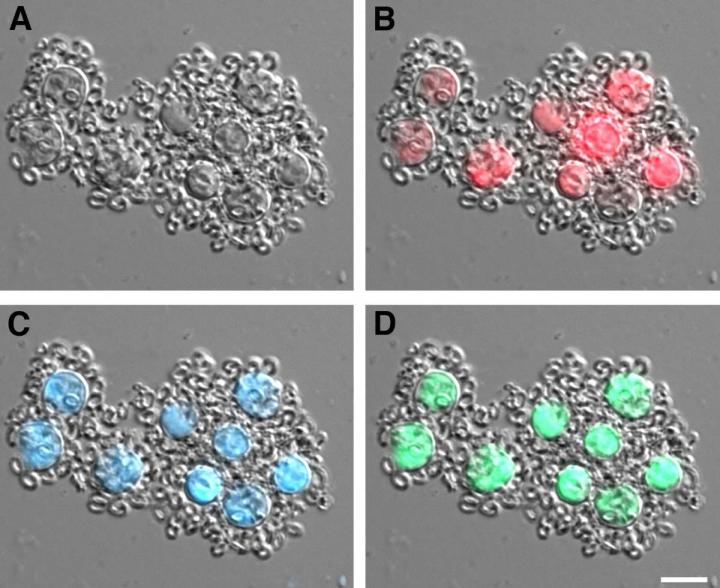Study shows first evidence bacterial-induced apoptosis in algae

These are phytoplankton infected with bacteria that induce programmed cell death. UAlberta microbiologists have observed apoptosis in single-cell algae for the first time -- with promising implications for new antibiotics and biofuels. Credit: Anna Bramucci, University of Alberta
A new study by UAlberta biologists shows the first evidence of apoptosis, or programmed cell death in algae. The outcomes have broad-reaching implications, from the development of targeted antibiotics to the production of biofuels in industry.
“It sounds odd, but programmed cell death is important to all large organisms. For any cells to differentiate, they have to be able to kill cells. For example, if you injure yourself, your scab is formed with these killed-off cells,” explained Rebecca Case, associate professor in UAlberta's Department of Biological Sciences.
“Here at the single-cell level, we've found that small molecules are passed from bacteria into the host algae. By doing that, the bacteria are able to tell the algae to kill itself.”
Until now, programmed cell death, also known as apoptosis, was thought to only occur in large, multicellular organisms such as animals and humans. This research shows that bacteria that live on single-cellular algae can cause programmed cell death. “It is the first documentation of true apoptosis via bacterial pathogens in microorganisms like algae,” said Case, who conducted the work with PhD graduate Anna Bramucci.
One potential application of this research is in drug discovery and development. Unlike traditional antibiotics, which kill all bacteria, this research can be applied to develop drugs with a more fine-tuned approach, turning individual bacteria or cells on and off. Previously Cas and colleagues have used this approach to find antibiotics that are effective at concentrations up to 1,000 times lower than traditional antibiotics.
“In interactions like these that occur in close proximity you can find molecules that are effective in very small concentrations,” said Case. “Going forward, that's what we want–really potent molecules.”
Another area of interest is in natural fuels derived from living matter, called biofuels. “Algae can also be used to create lipids for biofuels,” explained Case. “If we can better understand their life cycles, we can find ways to keep them alive for longer, to produce more fuel for industry.”
###
The paper, “Phaeobacter inhibens induces apoptosis-like programmed cell death in calcifying Emiliania huxleyi,” was published in Scientific Reports (doi: 10.1038/s41598-018-36847-6).
Media Contact
More Information:
http://dx.doi.org/10.1038/s41598-018-36847-6All latest news from the category: Life Sciences and Chemistry
Articles and reports from the Life Sciences and chemistry area deal with applied and basic research into modern biology, chemistry and human medicine.
Valuable information can be found on a range of life sciences fields including bacteriology, biochemistry, bionics, bioinformatics, biophysics, biotechnology, genetics, geobotany, human biology, marine biology, microbiology, molecular biology, cellular biology, zoology, bioinorganic chemistry, microchemistry and environmental chemistry.
Newest articles

Sea slugs inspire highly stretchable biomedical sensor
USC Viterbi School of Engineering researcher Hangbo Zhao presents findings on highly stretchable and customizable microneedles for application in fields including neuroscience, tissue engineering, and wearable bioelectronics. The revolution in…

Twisting and binding matter waves with photons in a cavity
Precisely measuring the energy states of individual atoms has been a historical challenge for physicists due to atomic recoil. When an atom interacts with a photon, the atom “recoils” in…

Nanotubes, nanoparticles, and antibodies detect tiny amounts of fentanyl
New sensor is six orders of magnitude more sensitive than the next best thing. A research team at Pitt led by Alexander Star, a chemistry professor in the Kenneth P. Dietrich…





















